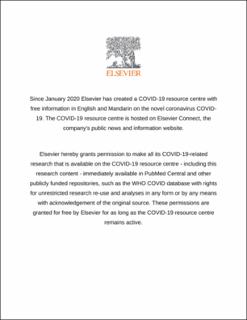| dc.contributor.author | Hussain, Akhtar | |
| dc.contributor.author | Bhowmik, Bishwajit | |
| dc.contributor.author | Moreira, Nayla Cristina do Vale | |
| dc.date.accessioned | 2020-07-09T09:39:49Z | |
| dc.date.available | 2020-07-09T09:39:49Z | |
| dc.date.created | 2020-05-09T13:07:38Z | |
| dc.date.issued | 2020 | |
| dc.identifier.citation | Hussain, A., Bhowmik, B. & Moreira, N. C. do V. (2020). COVID-19 and diabetes: Knowledge in progress. Diabetes Research and Clinical Practice, 162: 108142. doi: | en_US |
| dc.identifier.issn | 0168-8227 | |
| dc.identifier.uri | https://hdl.handle.net/11250/2661581 | |
| dc.description.abstract | Aims
We aimed to briefly review the general characteristics of the novel coronavirus (SARS-CoV-2) and provide a better understanding of the coronavirus disease (COVID-19) in people with diabetes, and its management.
Methods
We searched for articles in PubMed and Google Scholar databases till 02 April 2020, with the following keywords: “SARS-CoV-2”, “COVID-19”, “infection”, “pathogenesis”, “incubation period”, “transmission”, “clinical features”, “diagnosis”, “treatment”, “diabetes”, with interposition of the Boolean operator “AND”.
Results
The clinical spectrum of COVID-19 is heterogeneous, ranging from mild flu-like symptoms to acute respiratory distress syndrome, multiple organ failure and death. Older age, diabetes and other comorbidities are reported as significant predictors of morbidity and mortality. Chronic inflammation, increased coagulation activity, immune response impairment, and potential direct pancreatic damage by SARS-CoV-2 might be among the underlying mechanisms of the association between diabetes and COVID-19. No conclusive evidence exists to support the discontinuation of angiotensin-converting enzyme inhibitors (ACEI), angiotensin receptor blockers or thiazolidinediones because of COVID-19 in people with diabetes. Caution should be taken to potential hypoglycemic events with the use of chloroquine in these subjects. Patient tailored therapeutic strategies, rigorous glucose monitoring and careful consideration of drug interactions might reduce adverse outcomes.
Conclusions
Suggestions are made on the possible pathophysiological mechanisms of the relationship between diabetes and COVID-19, and its management. No definite conclusions can be made based on current limited evidence. Further research regarding this relationship and its clinical management is warranted. | en_US |
| dc.language.iso | eng | en_US |
| dc.publisher | Elsevier | en_US |
| dc.rights | Attribution-NonCommercial-NoDerivatives 4.0 Internasjonal | * |
| dc.rights.uri | http://creativecommons.org/licenses/by-nc-nd/4.0/deed.no | * |
| dc.title | COVID-19 and diabetes : Knowledge in progress | en_US |
| dc.type | Peer reviewed | en_US |
| dc.type | Journal article | en_US |
| dc.description.version | publishedVersion | en_US |
| dc.rights.holder | © 2020 The Author(s) | en_US |
| dc.subject.nsi | VDP::Medisinske Fag: 700::Helsefag: 800 | en_US |
| dc.source.pagenumber | 9 | en_US |
| dc.source.volume | 162 | en_US |
| dc.source.journal | Diabetes Research and Clinical Practice | en_US |
| dc.identifier.doi | 10.1016/j.diabres.2020.108142 | |
| dc.identifier.cristin | 1810064 | |
| dc.description.localcode | Unit Licence Agreement | en_US |

